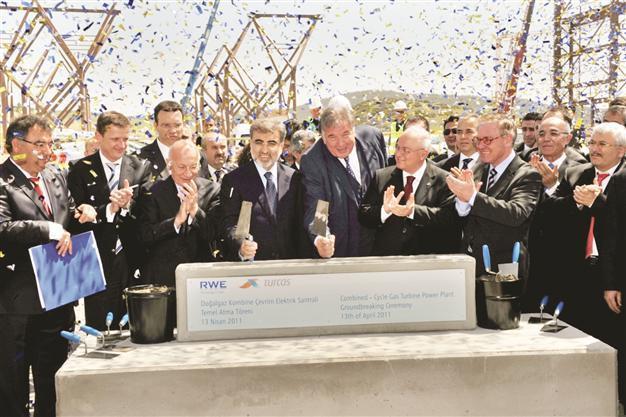Turkish economy woos new German businesses
FRANKFURT - Agence France-Presse

RWE executives and Energy Minister Taner Yıldız (C) are seen at the inauguration ceremony of the company’s power plant investment in the southwestern province of Denizli. German companies have accelerated their investments in the country. Hürriyet photo
Turkey’s steady economy increasingly attracts the attention of German companies and German-born Turks seeking employment as Europe continues to battle its ongoing debt crisis.Amidst the crisis-wracked eurozone the Turkish economy has expanded its gross domestic product (GDP) by an annual average of 5.4 percent over the past 10 years. Public debt has fallen below 40 percent of the GDP, a number much lower than what is seen in the majority of European countries. Inflation, once dizzyingly high in Turkey, has recently been put under control.
Long term strategy
“Flattening growth in [Europe] will trigger new growth and foreign direct investments in Turkey, making it an indispensable part of long-term strategic planning for European firms,” consultant Roland Berger wrote in a recent study.
Turkey has a population of 74 million, with more than 60 percent age 35 or younger and with purchasing power growing from year to year there is a strong demand in areas such as infrastructure, energy, cars and the financial sector.
These are precisely the sectors where German companies excel giving them an increased interest in Turkish markets. Out of around 30,000 foreign companies in Turkey, nearly 5,000 are German, according to the German-Turkish chamber of commerce in Istanbul. Indeed, the number of new German-funded companies set up in Turkey last year shot up 14 percent to reach 534.
Among them is Tedrive Steering, a company which manufactures steering systems and components for the automobile industry. The small specialist engineering firm has selected Turkey as the site for its first overseas assembly plant. The Turkish automobile market is “growing fast” and “German technology enjoys an excellent reputation there,” said the company’s chief executive Thomas Bruese.
“A lot of German companies have long been present in Turkey, but new subsidiaries, branches and joint ventures are signing up with the chamber of commerce,” said Ralph Jaeger, finance chief of RWE Turkey and deputy chief of the Chamber of Commerce, highlighting this as a sign German companies are expanding their activities in the country.
RWE, Germany’s number two power supplier, is investing 500 million euros in the construction of a gas-fired combined cycle power plant at Denizli, in the southwest of Turkey, to supply some 3.5 million households with electricity. The plant is scheduled to be up and running at the end of 2012.
Germany is Turkey’s main trading partner, accounting for 10.3 percent of its exports and 9.5 percent of its imports, according to data published by the German Trade & Invest development agency.
Germany invited hundreds of thousands of Turkish “guest workers” to enter Germany and fill jobs during the country’s economic miracle back in the 1960s. Many of these guest workers stayed and some three million Turks now form the largest immigrant population in the country. Indeed, it is the younger generations of those immigrants, who are equally at ease with both Turkish and German languages and culture that are increasingly being recruited by German companies for their Turkish operations said Jaeger.
A private training center in Kreuzberg, a multi-cultural district in the heart of Berlin, offers apprenticeships in German, English and Turkish in industry and in the hotel sector, with placements in German companies in Turkey.
















